Search Results
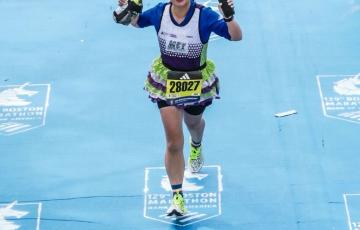
Shirley
The Boston Marathon marked my 33rd fundraiser for The Leukemia & Lymphoma Society (LLS), the 27th race with Team In Training (TNT), and the 6th Abbott World Marathon Major. With the support of amazing friends, teammates, and colleagues, I reached a lifelong goal—raising over $126,200 for LLS personally and over $1.6 million with the incredible teams I’ve been part of throughout the years, such as Team Child and Dynamite Runners.Inspired by my best friend, Christy, who donated her bone marrow to save her sister's life, I joined LLS as an intern in 2017.
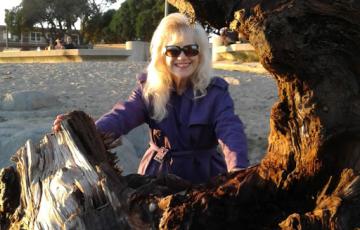
Vickie
I was diagnosed in 1974 at the age of 24 with Hodgkin lymphoma (HL). I had never even heard of it. The doctors did not know if I would survive as it was very aggressive. I had exploratory surgery (CAT scans and MRIs did not exist then as far as I know) and five weeks of radiation (I still glow in the dark, saves on night lights!!). Other than a couple of "unusual lymph nodes" over the years, I have been cancer-free. I went on to have two more great careers and was happily married for the first time at 49.
Robert
I am a three-time survivor of Hodgkin lymphoma (HL). First, I received full mantle radiation therapy in 1986, followed by chemotherapy in 1994, and finally a bone marrow transplant in 2004. I am now 17 years cancer-free. I owe my life to my oncologists, Winship Cancer Center in Atlanta, Georgia, and my wife. I was a First Connection® Program volunteer with The Leukemia & Lymphoma Society (LLS) for 10 years, but I dropped out because medical technology was developing so fast.
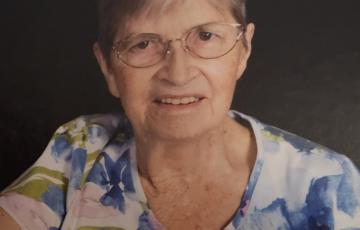
Laura
My mom raised seven kids before finding out she had myelodysplastic syndrome (MDS) and lymphoma, as well as Parkinson’s. She was going through treatment for the blood cancers, getting infusions of Rituxan® for the lymphoma, and transfusions of usually two units of blood when her red blood cell count was too low. We (us kids who live local) would sit with her (whoever was available) for the six+ hours it took for whichever treatment she was getting at the time. We played cards, fed her chocolate ice cream, laughed, and visited.
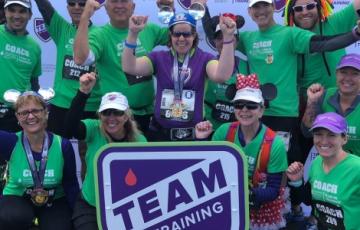
Georgia
Today I would like to give thanks to The Leukemia & Lymphoma Society. With the fantastic staff, and volunteers we have truly come so far. As an ALL survivor, Team In Training Alumni, and participant it is so amazing to see what we have all done for blood cancer patients and their families.
Sarah
On October 19, 2023, I went to urgent care for a cough that wouldn't go away. Turns out, it was a little more than a cough. A large mass in my chest was causing pneumonia. Two weeks later, I finally had a name for the mass ― primary mediastinal B-cell lymphoma (PMBCL). One thing that was very important to me early on in my cancer journey was fertility preservation. I knew that the chemotherapy I would get would put me at risk for infertility, so I advocated for myself and got an early referral to the reproductive and endocrinology (REI) clinic near me.
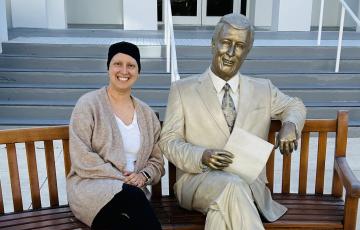
Leanne
In November 2023, on my 40th birthday, I had a biopsy on my neck for a swollen lymph node. We originally thought it was thyroid issues, but several scans and biopsies later led me to Sylvester Cancer Center at the University of Miami. A week later, I was diagnosed with diffused large B-cell lymphoma CD30+ (DLBCL), which I like to say is Hodgkin and non-Hodgkin lymphoma in one big bang, an aggressive rare form of cancer that required a specialized treatment with revolutionary drugs.
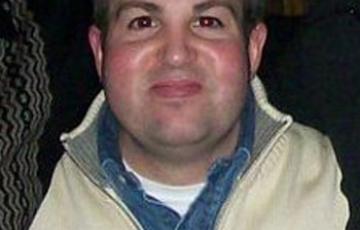
Tony
It was 40 years ago that Tony was diagnosed with acute lymphoblastic leukemia (ALL) at age 2. Back then, the disease wasn't very well understood, and the technologies and treatments didn't have a great deal to offer. It was a rough road, but Tony managed to make it through with the help of his mother and many experimental drugs. He went through chemotherapy, radiation, spinal taps, and hair loss, and at age 12, his doctors couldn't find any trace of leukemia.
Diagnosis
Having the correct diagnosis is important for getting the right treatment. Hodgkin lymphoma (HL) may be difficult to diagnosis. You may want to get a second medical opinion by an experienced hematopathologist before you begin treatment. A hematopathologist is a specialist who studies blood and bone marrow cells and other tissues to help diagnose diseases of the blood, bone marrow and lymph system.
Nikolette
I was truly honored to be a recipient of The Leukemia & Lymphoma Society (LLS) Scholarship for Blood Cancer Survivors. After fighting two different types of cancer, both forms of lymphoma and leukemia, I was unsure what my collegiate education would look like. I had to medically withdraw from my freshman year of college at Penn State University in the fall of 2018 when I received my second diagnosis. My family and I were completely devastated, but I was able to successfully undergo a bone marrow transplant and have been showing no evidence of disease (NED) for 3½ years now!
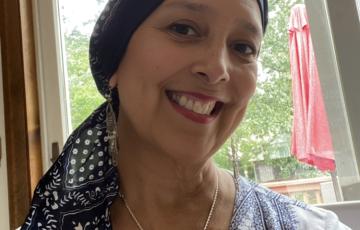
Anita
I was diagnosed with lymphoma in June, and on December 14, received the news I was in remission. I had primary mediastinal B-cell lymphoma (PMBL) to be exact. It is a very aggressive form of cancer, and within two weeks of being diagnosed, I had started chemotherapy. I started the regimen called DA-EPOCH-R. It is a 21-day cycle which consists of five days of treatment. I got continuous hours of chemo, and on the fifth day, I got two more infusions. I then had two weeks off.
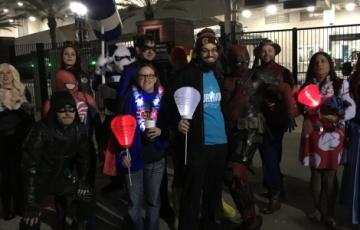
Sarah
My husband Patrick had a chest cold for about two months. I finally convinced him to go to the urgent care and they did an X-ray. Soon they found that he had an abnormally shaped aorta, so they sent him to our primary for testing.
They tested him and on July 5, 2017 and found that he had a mass in his chest that had caused his heart to move. It turns out the mass was Hodgkin lymphoma.
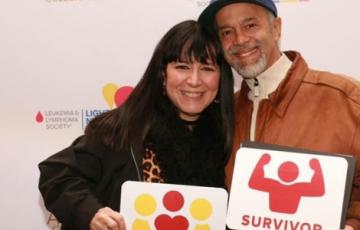
Marie and Miguel
Miguel was diagnosed with non-Hodgkin lymphoma (NHL) in early 2017. He was an active, healthy man his entire life, so this diagnosis came as a total shock. Both he and his wife didn't know what to expect or what the outcome would be and were both beyond devastated. After surgery, chemotherapy, numerous procedures, and hospital stays, Miguel and his wife were thrilled to hear the doctors say he had no evidence of disease as of late 2017.
Rhonda
In 2012, I was diagnosed with stage 4 non-Hodgkin lymphoma. I had 10 rounds of radiation and six treatments of chemotherapy (R-Chop). It was a very rough journey, however, by the grace of God, the love of family, and of course, the wonderful doctors and advances in cancer treatments I persevered through.
Peter
I do not aspire to be a hero, I just want other patients to realize that any one of us can have a long life after receiving such a horrible diagnosis. Times may be difficult but anything is possible.
On September 5, 2015, I celebrated the 25th anniversary of my autologous bone marrow transplant for non-Hodgkin lymphoma that took place at the Dana-Farber Cancer Institute in Boston. I want to thank my wife, children, and the many doctors, nurses, and technicians who treated me and continue to look after me in my senior citizen years.

Geoff
I'm a survivor of aggressive B-cell non-Hodgkin lymphoma. Seven cycles of R-CHOP reduced my tumor but did not kill it. I am fortunate to have been referred to the City of Hope for a stem cell transplant which took place a year ago April 8, which is also the day our first grandchild was born. So of the approximately 70,000 cases of non-Hodgkin lymphoma in 2013, I'm one of the roughly 50,000 to make it through treatment and into remission.

Stephen
Here's a truly inspiring story about a lymphoma patient and his treating physician who discovered in the midst of treatments last year that they shared a bond as former national champion ballroom dancers – and how the special connection affected his care.
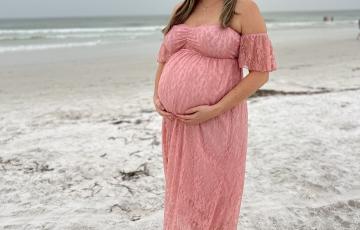
Holly
In February 2024, I had just entered my second trimester of pregnancy and woke up with a swollen lymph node on my neck about the size of a golf ball. After scans and two biopsies, I was diagnosed with diffuse large B-cell non-Hodgkin lymphoma (DLBCL). It was found to be high-grade (meaning it’s growing fast). This is an aggressive form of lymphoma, so I immediately began chemotherapy while pregnant. Waiting until after the baby was born for treatment (estimated six months later) was not in my best interest, and unfortunately, the risk of waiting was too high.
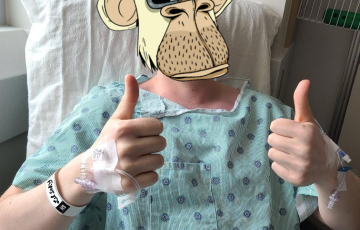
Daniel (Lil Sicky)
Cancel blood cancer with web3! Daniel is a 27-year-old lymphoma patient who combined his medical diagnosis and love of digital art into an NFT project supporting The Leukemia & Lymphoma (LLS) patients and their families.
In November 2021, Daniel was diagnosed with stage three nodular sclerosing Hodgkin lymphoma (NSHL). Like so many others during the COVID-19 pandemic, he has been isolated to protect his health and has been unable to work.
Holly
I noticed a bulge on my lower abdomen in December 2022. I had a negative ultrasound and CT. What was initially believed to possibly be a lipoma (benign tumor of fat) was later biopsied, and by May 2023, I was diagnosed with subcutaneous panniculitis-like T-cell lymphoma (SPTCL). It was a rare form of cutaneous lymphoma. I was young, active, and healthy, so I thought.

Pam
Pam Katten died on September 24, 2002 after a year-long battle with acute myeloid leukemia (AML).
Financial and Legal
Balancing WorkThe many responsibilities of caring for someone often leads to job conflicts. Work is a financial necessity and a major source of personal satisfaction, but for many caregivers, it is often difficult to balance the twin responsibilities of caregiving and working. Each caregiver’s working conditions are different. Talk to your supervisor and look in the employee handbook or other human resources publications to learn about your company’s policy on caregivers.

Angela
I am a two-time Hodgkin lymphoma (HL) cancer survivor. I was first diagnosed with stage 2 HL in 2006. I underwent chemo and radiation. The doctors at my check-ups were no longer looking for cancer but looking for the effects the treatment had on me. Well, eight years later it came back aggressively as stage 4 HL in my lung. I went to Dr. Armitage at Nebraska Medicine and underwent a stem cell transplant using brentuximab vedotin, a target therapy drug that was successful. He is a worldwide expert on lymphoma, so I knew I was in good hands.
Samantha
In February 2023, I was on top of the world. I turned 27 years old, I was training for a new position at my dream company, I spent an amazing weekend in Nashville with girlfriends, and had just touched down from Mexico after spending a fantastic weekend with one of my best friends. Everything felt right ― for the most part. While this month was filled with love, laughter, and good times, it was also filled with night sweats, stomach pains, and overall feelings of illness.